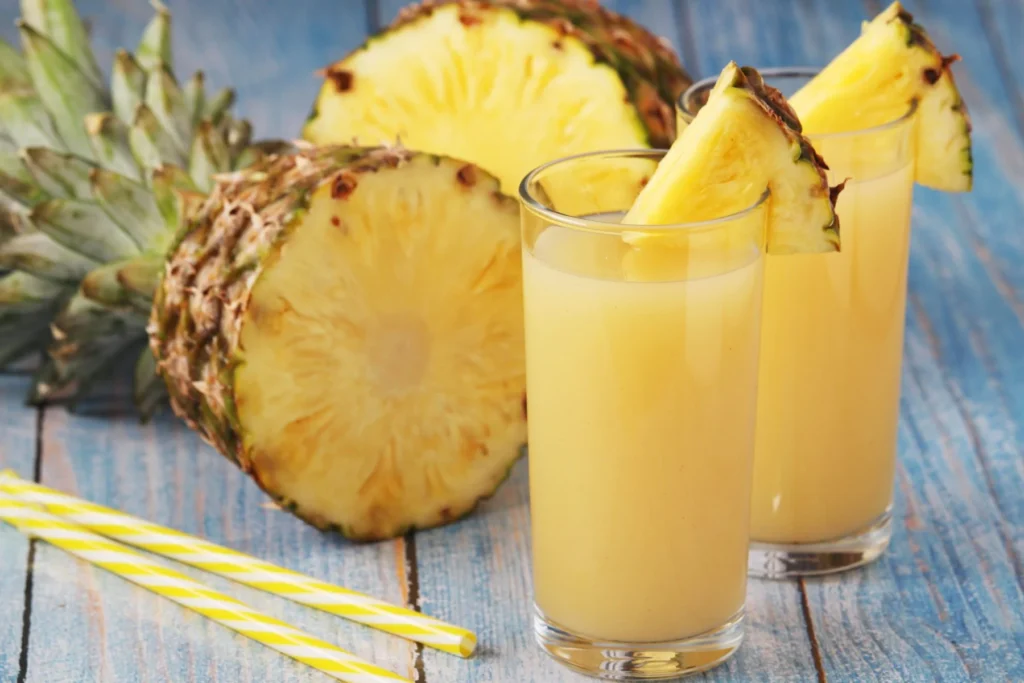When it comes to recovering from wisdom teeth extraction, finding remedies to ease the pain and discomfort is a top priority for many. The wisdom teeth, which are the third and last set of molars to develop, have plagued countless people due to the pain and dental issues it has caused. As such, many have chosen to have it removed eliminate the problem or prevent it from happening.
Most of us have probably heard the horror stories of the swelling and pain after the surgery. Among the numerous home remedies that have gained popularity, pineapple juice stands out as a potential solution. So, does pineapple juice help with recovery after your wisdom teeth removal surgery?
The answer is yes, pineapple juice does help with recovery. Its claim to fame lies in the presence of an enzyme called bromelain, believed to possess anti-inflammatory properties that can aid in reducing swelling and soothing the affected area.
In the rest of this article, we will take a deep dive into the science behind the humble pineapple and attempt to shed light on the true impact of pineapple juice on wisdom teeth healing.
What Is in a Pineapple?
Pineapple is a tropical fruit known for its distinct taste and juicy texture. They are native to South America, specifically the region encompassing Brazil, Paraguay, and the northeastern part of Argentina. However, pineapple cultivation has spread to various tropical and subtropical regions, including countries like the Philippines, Thailand, Costa Rica, and Hawaii.

It is packed with various nutrients and bioactive compounds that contribute to its nutritional value. Here are some of the key components found in pineapple:
- Vitamins: Pineapple is a rich source of vitamins, particularly vitamin C. A serving of pineapple can provide a significant portion of the recommended daily intake of vitamin C, which plays a crucial role in supporting immune function, collagen synthesis, and antioxidant protection.
- Minerals: Pineapple contains essential minerals such as manganese, which is important for bone health, metabolism, and antioxidant defense. It also provides smaller amounts of potassium, copper, magnesium, and iron.
- Enzymes: Pineapple contains bromelain, an enzyme mixture found predominantly in the stem and core of the fruit. Bromelain has been studied for its potential health benefits, including anti-inflammatory properties and digestive enzyme activity.
- Fiber: Pineapple is a good source of dietary fiber, which aids in digestion, promotes bowel regularity, and helps maintain a healthy weight.
- Antioxidants: Pineapple contains various antioxidants, including flavonoids and phenolic compounds. These antioxidants help combat oxidative stress and protect the body’s cells from damage caused by free radicals.
- Carbohydrates: Pineapple is naturally sweet due to its carbohydrate content. The main carbohydrate in pineapple is sucrose, along with smaller amounts of glucose and fructose.
- Water: Pineapple has a high water content, making it hydrating and refreshing.
By encompassing these beneficial components, pineapple offers a flavorful and nutrient-rich addition to a balanced diet. So what are the benefits of eating a pineapple or drinking its juice?
Benefits of Pineapple Juice
As mentioned above, the juice of a pineapple is a rich source of vitamins and minerals. More importantly, it contains essential enzymes that can aid in digestion and reduce inflammation. Some potential benefits of drinking pineapple juice include:
- Boosting the immune system: Vitamin C is an antioxidant that helps to protect the body against infection and disease.
- Improving digestion: Pineapple juice contains bromelain, an enzyme that can help to break down proteins and reduce inflammation in the gut.
- Promoting anti-inflammatory properties: Bromelain has been studied for its ability to reduce inflammation in the body, which may be beneficial for conditions such as arthritis or sports-related injuries.
- Promoting healthy skin: Vitamin C helps to protect the skin from damage and may promote the production of collagen, which helps to keep the skin looking youthful.
- Aiding in weight loss: Pineapple juice is low in calories and may help to suppress appetite, which can aid in weight loss.
Given the numerous benefits that pineapple offers, one may confer it as a super fruit. However, consumption of pineapple juice should be in moderation. Overconsumption of pineapple can lead to complications such as diarrhea, abdominal pain, and increased heart rate. As a rule of thumb, limit your daily intake of pineapple juice to no more than 8 oz (230ml) a day.
It is also important to be aware that commercially sold pineapple juice may contain large amounts of sugar. For instance, a 8.4 oz can of Dole 100% Pineapple Juice alone contains 30 grams of sugar. 64 oz of pineapple juice would set you back more than 240 grams of sugar; this is over 9 times the recommended sugar daily intake by American Heart Association for women, and 6 times more for men.
To consumption of large amount of sugar will inadvertently aid the formation of plaque. When the plaque is not promptly removed, it will damage the tooth enamel and cause cavities.
Can Pineapple Juice Help With Recovery After Surgery?
In late 2021, a Tiktok video went viral after claiming to have found the ‘secret’ to alleviating your pain after your wisdom tooth extraction. In the video, the user asserted that drinking approximately 64oz (1.8 litres) of pineapple juice prior the surgery can help to reduce pain and swelling, thereby speeding up the recovery process.
@valeriagreenz If you want to see more check out my new wisdom teeth vlog on YouTube channel @ Valeriagreenz #wisdomteeth #wisdomteethremoval #pinapplejuice
♬ How You Feel? (Freestyle) (feat. Lil Yachty & Ski Mask The Slump God) – DJ Scheme & Danny Towers
Since the release of the Tiktok video, thousands have tried out the method. Many have attested to the viral claim, saying that drinking large amount of pineapple juice have indeed minimize swelling. In several of the ‘before and after surgery’ videos and selfies, Tiktokers appeared to have reduced the swelling significantly within hours.
So the million dollar question is, does pineapple juice help with wisdom teeth removal after the surgery? Surprisingly, the answer is a big YES. Pineapple juice does help with the reduction of the swelling.
Minimizing Pain and Swelling with Bromelain
So how does drinking pineapple juice reduce swelling and pain after the wisdom tooth surgery?
The viral claim is largely attributed to the proteolytic enzyme known as bromelain. Found specifically in pineapples, bromelain has been widely promoted for its anti-inflammatory and digestive properties.
Some small studies demonstrating” an anti-inflammatory effect from bromelain supplements, but said that at the same there have been studies “showing no effects.”
Renown Dietitian Samantha Cassetty
In fact, pineapple has been used in Central American Indigenous cultures for centuries to treat conditions relating to indigestion and inflammation. Today, bromelain, mostly sold in the form of supplements and cream, have been used to treat an variety of conditions including sinus swelling, inflammation, minor burn injuries, arthritis, and poor digestion.
You may be interested in: Does Wisdom Teeth Removal Hurt at All?
In a small-scale study conducted on 40 patients, 28 (70%) of them reported a reduction in swelling and pain after consuming bromelain tablets for up to a week. That said, there are insufficient scientific studies done on bromelain to conclude and credit the enzyme with its purported medical benefits, including the minimizing of pain and swelling after wisdom tooth surgery.
To reduce pain and swelling after wisdom tooth surgery, most doctors would prescribe painkillers such as Ibuprofen or prescription opioids such as oxycodone. Patients are also advised to apply ice pack to the swollen area every 3 hours for the first 24 hours after the surgery. Antibiotics are prescribed to reduce the risk of an infection albeit it is optional in most wisdom teeth removal surgery.
So, Should I Drink Pineapple Juice?
To conclude, there is some evidence to suggest that pineapple juice can help with your post-surgery recovery, and this is largely attributed to the presence of bromelain in the fruit. However, more research is needed to confirm the effectiveness of pineapple juice or bromelain supplements in reducing swelling after wisdom teeth surgery.
Even if pineapple juice help with reducing any pain and swelling after your wisdom tooth surgery, the method of chugging down 64 oz of the drink is impractical; you are better off purchasing bromelain supplements from your local pharmacy as it is this enzyme that works the wonder. In any case, always consult your dentist or oral surgeon as they are able to offer their expert opinion and guide you in your recovery after the surgery.
If you are experiencing swelling after a dental procedure or injury, it is better to follow the advice and recommendations of your dentist or oral surgeon. It is important to remember that swelling after dental surgery can be a normal part of the healing process, and it typically subsides over time. Following proper post-operative care instructions, including rest, proper oral hygiene, and a suitable diet, is key to ensuring a smooth recovery.
Disclaimer: Note that the information presented in this blog is not a substitute for professional medical advice. If you have recently undergone wisdom teeth extraction or plan to do so, consult with your dentist or oral surgeon for personalized recommendations tailored to your specific situation. Remember, their expertise is crucial in ensuring a smooth and successful recovery.
However, before we embrace pineapple juice as the magical elixir for wisdom teeth recovery, it’s crucial to examine the scientific evidence and separate fact from fiction.







